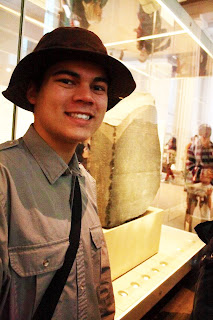This will probably be short and definitely take a more personal tone than is usual for this site, but I wanted to share it anyways. I just got back from a small group retreat to Maine this afternoon and while I was there, one of the girls in the group gave me a pack of gum with a quote from Alexander Pope on it saying that it reminded her of me. (I had mentioned something about emergent order in a conversation prior to that.)
"Where order in variety we see, and where, though all things differ, all agree."
Now, here's the rest of the section for some context.
Here earth and water, seem to strive again;
Not Chaos like together crushed and bruised,
But as the world, harmoniously confused:
Where order in variety we see,
And where, though all things differ, all agree.
Since it comes from a poem, the interpretation is obviously subjective but I pulled from it the concept of order in what would otherwise be a disordered world. The idea itself is called "Emergent Order" and was started by Adam Smith in his Wealth of Nations book but was developed over the course of an entire career by F.A. Hayek. Perhaps my next post will be a longer explanation of how emergent order works, but for the time being, contemplate on the fact that there are billions of people all over the world who have as many different tastes, preferences, skills, levels of intelligence, kinds of intelligence, experiences, knowledge, memories, etc. Note that each of the people personally only interact with an infinitesimally small percentage of the rest of the people. Consider that everyone makes life choices both big and small based on their personal characteristics mentioned above as well as other factors.
Finally: realize that humanity has progressed so much over the course of its history in such ways that require incredible feats of cooperation between millions and billions of people. The wondrous way that the world is today was achieved without some ruler of humanity dictating individuals' actions for thousands of years. And do my question is, "How is this possible? How was all the cooperation achieved?"
Tune in next time.
Read More...
"Where order in variety we see, and where, though all things differ, all agree."
Now, here's the rest of the section for some context.
Here earth and water, seem to strive again;
Not Chaos like together crushed and bruised,
But as the world, harmoniously confused:
Where order in variety we see,
And where, though all things differ, all agree.
Since it comes from a poem, the interpretation is obviously subjective but I pulled from it the concept of order in what would otherwise be a disordered world. The idea itself is called "Emergent Order" and was started by Adam Smith in his Wealth of Nations book but was developed over the course of an entire career by F.A. Hayek. Perhaps my next post will be a longer explanation of how emergent order works, but for the time being, contemplate on the fact that there are billions of people all over the world who have as many different tastes, preferences, skills, levels of intelligence, kinds of intelligence, experiences, knowledge, memories, etc. Note that each of the people personally only interact with an infinitesimally small percentage of the rest of the people. Consider that everyone makes life choices both big and small based on their personal characteristics mentioned above as well as other factors.
Finally: realize that humanity has progressed so much over the course of its history in such ways that require incredible feats of cooperation between millions and billions of people. The wondrous way that the world is today was achieved without some ruler of humanity dictating individuals' actions for thousands of years. And do my question is, "How is this possible? How was all the cooperation achieved?"
Tune in next time.





